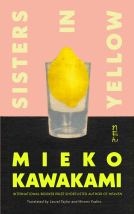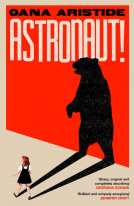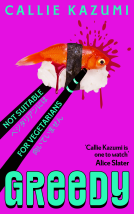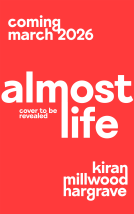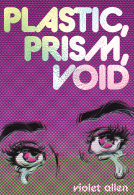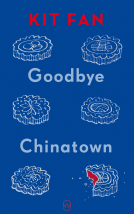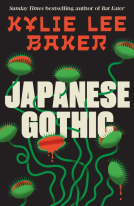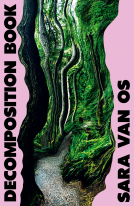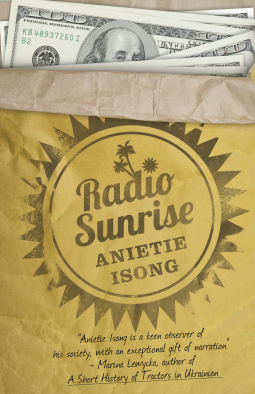
Radio Sunrise
by Anietie Isong
This title was previously available on NetGalley and is now archived.
Send NetGalley books directly to your Kindle or Kindle app
1
To read on a Kindle or Kindle app, please add kindle@netgalley.com as an approved email address to receive files in your Amazon account. Click here for step-by-step instructions.
2
Also find your Kindle email address within your Amazon account, and enter it here.
Pub Date 1 Jan 2017 | Archive Date 8 Mar 2022
Description
Winner of the McKitterick Prize 2018.
"Never cover an assignment without collecting a brown envelope," Boniface had said. "It is a real life saver for all journalists in this country."
Ifiok, a young journalist working for the government radio station in Lagos, Nigeria, always aspires to do the right thing, but the odds seem to be stacked against him. Government pressures cause the funding to his radio drama to get cut off, his girlfriend leaves him when she discovers he is having an affair with an intern, and kidnappings and militancy are on the rise in the country. When Ifiok travels to his hometown to do a documentary on some ex-militants’ apparent redemption, a tragi-comic series of events will make him realise he is unable to swim against the tide of corruption.
Building on the legacy of the great African satirist tradition of Ngugi Wa Thiongo and Ayi Kwei Armah, Radio Sunrise paints a sharp-tongued portrait of (post) post-colonial Nigeria.
Marketing Plan
-
For fans of Marina Lewycka, Elnathan John, Igoni A Barrett
-
Anietie Isong is part of an exciting wave of contemporary, fresh voices
coming out of Nigeria and the African continent
-
Winner of the Commonwealth Short Story Award and finalist of the
Remember Oluwale Writing Prize
-
Isong is a former journalist with ties to the media in the UK and Nigeria.
-
Highly reviewable – endorsements and reviews expected from multiple
Available Editions
| EDITION | Ebook |
| ISBN | 9781909762381 |
| PRICE | £3.99 (GBP) |
Average rating from 6 members
Featured Reviews
Radio Sunrise is a satirical novel about radio broadcasting and underhand corruption in Nigeria which gives a humourous insight into the problems of being a journalist for a state-funded station. Ifiok works for Radio Sunrise and things start going wrong when his radio drama has its funding cut and his girlfriend leaves him after he cheats on her, but when he is sent back to his home town to make a documentary on a government-funded project he discovers there’s plenty more to go wrong yet.
Isong’s novel focuses on hypocrisy and corruption on both a large and a small scale, but it is the smaller scale moments that really capture the satire particularly well, with journalists only writing news stories if they are paid enough in their brown envelopes. The narrator Ifiok is a naive idealist much of the time which makes him an ideal satiric character, shocked by other’s adulterous relationships and unable to stand up to the system even when he wants to expose its flaws. Isong depicts a complex mix of problems across Nigeria, but all with a light satiric touch that makes for a fun and engaging novel.
 Nick B, Reviewer
Nick B, Reviewer
Ifiok is a journalist at a government radio station in Lagos, Nigeria. He has a lovely girlfriend, Yetunde, dreams of entering his radio series The River into the BBC Africa drama competition and his boss seems to like him. He seems well set up.
From a narrative perspective, this allows Ifiok to travel freely around the city, observing different vignettes of everyday life - whether in big business or dramas on the street with begging scams and petty thievery. Ifiok himself is part of the emergent middle class, dining in restaurants and buying Yetunde designer dresses, but not in the same league as the army generals driving around in their high black people carriers. And these vignettes are well told, colourful and often amusing.
What is lacking, though, is an over-arching narrative thread. At first it looks as though it might be a quest for funding for The River as government funding for it is cut. This could have lead to all sorts of nefarious schemes and scams, motivated by some form of community spirit. But the story line fizzles out. Instead, Ifiok returns to his family home in the oilfields and has a think about his love life. It feels like the wrong choice of narrative direction.
Nevertheless, this is a colourful, entertaining and short read. Three and a half stars perhaps nudging slightly on the side of four.
 Reviewer 172379
Reviewer 172379
The author has very cleverly centered and discussed very important issues, unearthed things that some of us would rather look away from, or pretend doesn't exist. All this without seeming for a moment to shove agenda down the readers' throats. Very well done.
